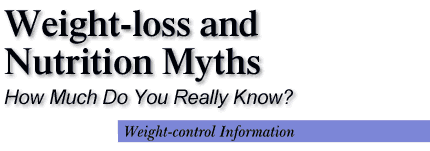
Weight-Loss & Nutrition Myths
Myth: Fad diets work for permanent weight loss.
Fact: Fad diets are not the best way to lose weight and keep it off. Fad diets often promise quick weight loss or tell you to cut certain foods out of your diet. You may lose weight at first on one of these diets. But diets that strictly limit calories or food choices are hard to follow. Most people quickly get tired of them and regain any lost weight.
Fad diets may be unhealthy because they may not provide all of the nutrients your body needs. Also, losing weight at a very rapid rate (more than 3 pounds a week after the first couple weeks) may increase your risk for developing gallstones (clusters of solid material in the gallbladder that can be painful). Diets that provide less than 800 calories per day also could result in heart rhythm abnormalities, which can be fatal.
Tip: Research suggests that losing ½ to 2 pounds a week by making healthy food choices, eating moderate portions, and building physical activity into your daily life is the best way to lose weight and keep it off. By adopting healthy eating and physical activity habits, you may also lower your risk for developing type 2 diabetes, heart disease, and high blood pressure.
Myth: High-protein/low-carbohydrate diets are a healthy way to lose weight.
Fact: The long-term health effects of a high-protein/low-carbohydrate diet are unknown. But getting most of your daily calories from high-protein foods like meat, eggs, and cheese is not a balanced eating plan. You may be eating too much fat and cholesterol, which may raise heart disease risk. You may be eating too few fruits, vegetables, and whole grains, which may lead to constipation due to lack of dietary fiber. Following a high-protein/low-carbohydrate diet may also make you feel nauseous, tired, and weak.
Eating fewer than 130 grams of carbohydrate a day can lead to the buildup of ketones (partially broken-down fats) in your blood. A buildup of ketones in your blood (called ketosis) can cause your body to produce high levels of uric acid, which is a risk factor for gout (a painful swelling of the joints) and kidney stones. Ketosis may be especially risky for pregnant women and people with diabetes or kidney disease.
Tip: High-protein/low-carbohydrate diets are often low in calories because food choices are strictly limited, so they may cause short-term weight loss. But a reduced-calorie eating plan that includes recommended amounts of carbohydrate, protein, and fat will also allow you to lose weight. By following a balanced eating plan, you will not have to stop eating whole classes of foods, such as whole grains, fruits, and vegetables—and miss the key nutrients they contain. You may also find it easier to stick with a diet or eating plan that includes a greater variety of foods.
Myth: Starches are fattening and should be limited when trying to lose weight.
Fact: Many foods high in starch, like bread, rice, pasta, cereals, beans, fruits, and some vegetables (like potatoes and yams) are low in fat and calories. They become high in fat and calories when eaten in large portion sizes or when covered with high-fat toppings like butter, sour cream, or mayonnaise. Foods high in starch (also called complex carbohydrates) are an important source of energy for your body.
Tip: A healthy eating plan is one that:
- Emphasizes fruits, vegetables, whole grains, and
fat-free or low-fat milk and milk products.
Includes lean meats, poultry, fish, beans, eggs, and nuts. - Is low in saturated fats, trans fat, cholesterol, salt (sodium), and added sugars.
- For more specific information about food groups and nutrition values, visit: healthierus.gov/dietaryguidelines.
Myth: Certain foods, like grapefruit, celery, or cabbage soup, can burn fat and make you lose weight.
Fact: No foods can burn fat. Some foods with caffeine may speed up your metabolism (the way your body uses energy, or calories) for a short time, but they do not cause weight loss.
Tip: The best way to lose weight is to cut back on the number of calories you eat and be more physically active.
Myth: Natural or herbal weight-loss products are safe and effective.
Fact: A weight-loss product that claims to be "natural" or "herbal" is not necessarily safe. These products are not usually scientifically tested to prove that they are safe or that they work. For example, herbal products containing ephedra (now banned by the U.S. Government) have caused serious health problems and even death. Newer products that claim to be ephedra-free are not necessarily danger-free, because they may contain ingredients similar to ephedra.
Tip: Talk with your health care provider before using any weight-loss product. Some natural or herbal weight-loss products can be harmful.
